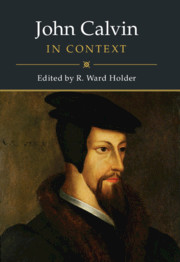Book contents
- John Calvin in Context
- John Calvin in Context
- Copyright page
- Dedication
- Contents
- Contributors
- Acknowledgments
- Abbreviations
- Introduction
- Part I France and Its Influence
- Part II Switzerland, Southern Germany, and Geneva
- Part III Empire and Society
- Part IV The Religious Question
- Part V Calvin’s Influences
- 34 Calvin and Luther
- 35 Calvin and Melanchthon
- 36 Calvin and the Swiss and South German Evangelicals
- 37 Calvin’s Friends
- 38 Calvin’s Critics
- 39 Calvin’s Lutheran Critics
- 40 Calvin’s Catholic Critics
- 41 Calvin and the Anabaptists
- Part VI Calvin’s Reception
- Conclusion
- Bibliography
- Index
- References
35 - Calvin and Melanchthon
from Part V - Calvin’s Influences
Published online by Cambridge University Press: 14 November 2019
- John Calvin in Context
- John Calvin in Context
- Copyright page
- Dedication
- Contents
- Contributors
- Acknowledgments
- Abbreviations
- Introduction
- Part I France and Its Influence
- Part II Switzerland, Southern Germany, and Geneva
- Part III Empire and Society
- Part IV The Religious Question
- Part V Calvin’s Influences
- 34 Calvin and Luther
- 35 Calvin and Melanchthon
- 36 Calvin and the Swiss and South German Evangelicals
- 37 Calvin’s Friends
- 38 Calvin’s Critics
- 39 Calvin’s Lutheran Critics
- 40 Calvin’s Catholic Critics
- 41 Calvin and the Anabaptists
- Part VI Calvin’s Reception
- Conclusion
- Bibliography
- Index
- References
Summary
Philip Melanchthon is undoubtedly one of the most significant figures to emerge from the Reformation. However, his legacy is frequently overshadowed by Martin Luther and John Calvin – in large part because of his close relationship with both. Because of this, Melanchthon has infrequently been the focus of historical research, functioning much more frequently as a footnote to Luther or a sounding board for Calvin. Yet Melanchthon’s work and writings shaped the religious landscape of Europe and he left an indelible influence on both Lutheranism and the Reformed tradition – particularly through his biblical scholarship and Loci Communes. The overlooking of Melanchthon is, to some extent, explained by the final years of his life, during which he was almost universally disdained for his perceived betrayal of Lutheran principles at the Leipzig Interim. Because of this, Melanchthon has frequently been disregarded or maligned in confessional histories of Lutheranism and the Reformed faith. In more recent years, however, the significance of Melanchthon’s Loci Communes, his contributions to early modern biblical scholarship, his role in the political developments of the German Reformation, and his relationship with Calvin have come to be recognized as formative influences on the history of the early modern world.
- Type
- Chapter
- Information
- John Calvin in Context , pp. 310 - 317Publisher: Cambridge University PressPrint publication year: 2019

